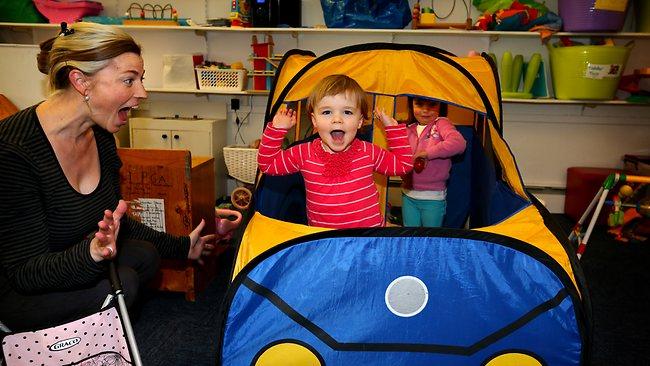Anger as the fun police take over
THEY have been part of life for 40 years -- volunteer mums, dads, grandparents and their young children meeting at their local playgroup.

THEY have been part of life for the past 40 years -- volunteer mums, dads, grandparents and their young children meeting each week at their local community playgroup.
But they are under threat from a new model pushed by the Rudd government, which has taken control from families.
Community Playgroups in Australia will launch a campaign to double the number of groups it runs across the nation and put pressure on both sides of politics to greatly boost its funding, arguing it has been sidelined by a preference for new models that don't have parents and children at the centre.
The group is requesting $17.27 million over four years on top of its funding of approximately $3.2m a year -- less than $8 per playgroup per week.
It argues government data shows community playgroups form 43 per cent of the clients in the Family Support Program for about 3 per cent of its budget.
In campaign material to be sent to all parties, it says recent government policy approaches have had hurt community playgroups, "compromising their viability".
"The concept of community playgroups is ground-breaking," the group says. "Given how low cost this uniquely Australian model of volunteer service delivery is, it is remarkable that its survival is now at stake."
The group adds that the Rudd government has favoured expensive facilitated playgroups for vulnerable families.
"These new kinds of playgroups have had a devastating effect on community playgroups who also cater for vulnerable and disadvantaged families," the group says.
"The irony is that these facilitated groups often build dependency. They are short-term, and not self-sustaining or community capacity building, so when they leave the community is usually poorer."
In recent years, it says, there have been both a loss of venues and substantial increases in the costs of venues. There have also been substantial increases in insurance and consumables. All these increases have been borne by parents. "This means that one of the biggest barriers to parent attendance at playgroup is cost".
The group's chief executive, Anne-Marie Mioche, said that if community-based playgroups were not boosted now it would be the end of a uniquely Australian era. "A new government policy leached capacity away from the playgroup model," she said.
"Fully funded expert-supervised playgroups were set up in competition with existing community playgroups. They adapted our model and decimated our membership. This is the end of an era. Community playgroups are a uniquely Australian model of volunteerism and unless government pays its fair share it's the end of the road for us."
Canberra mother Sophie McLean, who takes daughter Harriett to a playgroup, said she loved the opportunity they gave children to interact.
"But I also get reassurance from other mothers about my mothering," she said.
The government says the reduction is largely due to parents opting for formal care upon their return to work and an increase in children attending pre-school from age four.



